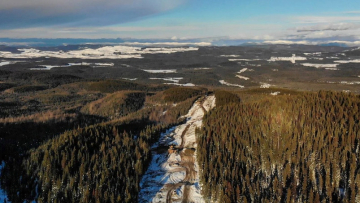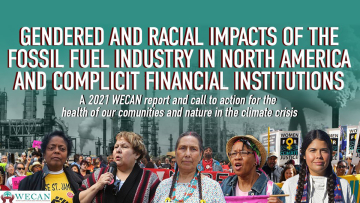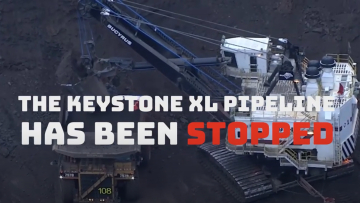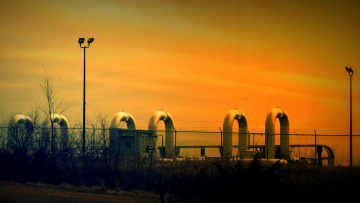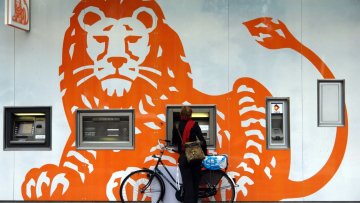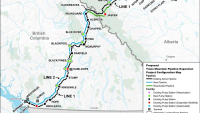Project – On record
This profile is no longer actively maintained, with the information now possibly out of date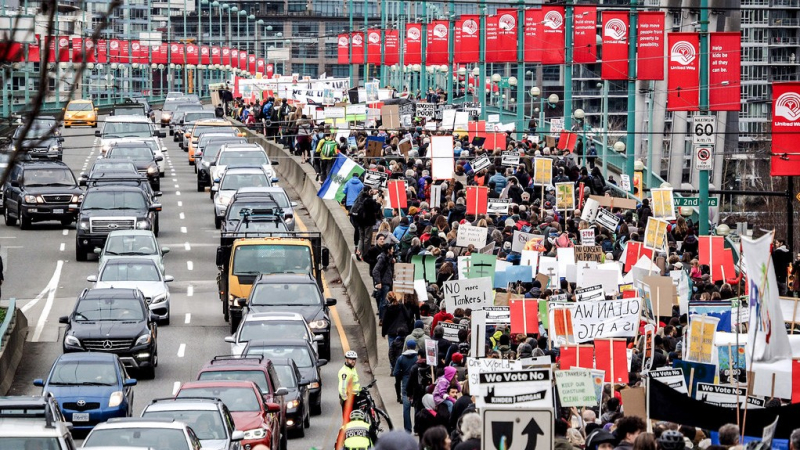
Project – On record
This profile is no longer actively maintained, with the information now possibly out of dateWhat must happen
Private sector banks should refuse any future opportunity to finance this project, or provide financial services to this company, whether under government or private sector control.
| Sectors | Pipeline Transportation of Crude Oil |
| Location |
|
| Status |
Planning
Design
Agreement
Construction
Operation
Closure
Decommission
|
| Website | https://www.transmountain.com/ |
|
|
This project has been identified as an Equator Project |
The Trans Mountain Pipeline Expansion project, an expansion of the original Trans Mountain Pipeline (built in 1951), is a 1,150 km pipeline between Strathcona County, Alberta and Burnaby, BC. in Canada. The pipeline is the only West Coast link for Western Canadian oil. The expansion (in the form of a parallel pipeline) is expected to almost triple the capacity of the system, taking an additional 590,000 barrels of crude oil from the Alberta tar sands each day to the Burnaby refinery on Vancouver Harbor. From there, the oil would be loaded onto supertankers to be shipped out across the Pacific. The projected capital costs were CAD 12.6 billion, but have skyrocketed to CAD 21.4 billion due to delays resulting from widespread and powerful opposition.
Impact on human rights and communities
The Trans Mountain Pipeline expansion poses a grave threat to Indigenous people, as described in this letter written by several NGOs and groups of Indigenous people to 28 banks who were, at the time, involved in financing the project. The parallels with the struggle over the Dakota Access Pipeline are clear, leading to questions about whether the Trans Mountain conflict may become the “Standing Rock of the North.”
The Trans Mountain project does not have the Free, Prior and Informed Consent (FPIC) of the Indigenous people it will affect. First Nations groups that would be directly impacted by the route and port terminal are fighting the project in the courts and leading heated protests on the ground. As of July 2019, Tsleil-Waututh Nation, Squamish Nation, Ts’elxweyeqw tribes, Shxw’owhamel Nation, Coldwater Indian Band and Stk’emlupsemc te Secwepemc Nation were involved in multiple legal challenges to the pipeline’s construction. and direct action campaigns have been ongoing. The Tsleil-Waututh established a “Watch House” on their territory to monitor and resist construction; Secwepemc women have established the “Tiny House Warriors,” small, mobile houses built to reoccupy Secwepemc territory and prevent pipeline construction. The Tiny House Warriors are a group of Secwepemc and Ktunaxa people positioned along the route to peacefully protest Trans Mountain from crossing unceded Secwepemc Territory. This group of primarily women was violently attacked in April, 2020 and their memorial of red dresses for missing and murdered Indigenous women and girls was destroyed. Detailed reports, such as Standing Rock of the North and Assessment of the Trans Mountain Pipeline and Tanker Expansion Proposal outline, in detail, crucial elements of Indigenous opposition to the project.
In December 2019, a cease and desist order for TMX was sent from the United Nations Committee for the Elimination of Racial Discrimination to Canada.396 The committee explicitly expressed that: “by the refusal [of Canada] to consider Free, Prior and Informed Consent [FPIC] as a requirement for any measure, such as large-scale development projects, that [Canada] may cause irreparable harm to indigenous peoples rights, culture, lands, territories and way of life.”The government has not taken any action. Since then, TMC has entered Indigenous Mutual Benefits Agreements with 69 First Nations but disregards other Indigenous People and does not once refer to the FPIC. In reaction, Indigenous People are more determined than ever to own a share of the Pipeline to ensure their rights are protected.
Projects like TMEP pose particular risks for Indigenous women. Construction work is impacting environmental features integral to Indigenous women’s identity and culture by harming their sacred relationship to both water and Mother Earth. The temporary male housing sites used for pipeline construction workers (called "man camps") are linked to increased abuse and safety threats to Indigenous women, girls and two-spirit people, contributing to the Missing and Murdered Indigenous Women, Girls and Two-Spirit People epidemic. The housing of mostly out-of-state workers in the camps poses additional risks in the context of the Covid-19 pandemic.
As noted by the Treaty Alliance Against the Tar Sands, the expansion of the Canadian tar sands would lead to increased destruction and poisoning of lands, waters and air on Indigenous territory. There is widespread opposition to tar sands expansion among these groups, who are committed to fighting the pipelines which make such expansion profitable.
Impact on climate
The extraction and refinement of oil sands release copious amounts of greenhouse gases. Oil sands are difficult to remove from the ground and must be upgraded into synthetic crude to be useful. Producing a single barrel of synthetic oil may release up to three times as much carbon dioxide as producing a barrel of conventional crude. The expansion project would triple the pipeline's transport capacity to 890,000 barrels per day.
For Canada to fully exploit its oil sands resources and still meet its climate goals, according to one study, the country would need to reduce emissions in every other sector (including transportation, waste, and agriculture) by more than half. The burden of avoiding catastrophic climate change would move away from the real culprits - the fossil fuel industry.
Impact on nature and environment
The TMEP would draw heavily on supply from the Alberta tar sands in Canada. These bitumen deposits require a lot of effort to extract, and process before the oil can be sent to conventional refineries. Most of the current extraction process takes place in open-pit mines, with massive machinery scraping up the tarry sandstone and moving it to facilities for processing. The heavy crude is found mixed with sand, clay, and water, which must be removed, then the heavy crude must be "upgraded" to reduce viscosity and improve quality (The Atlantic, Greenpeace). This extraction process has a heavy carbon footprint and has a a devastating effect on land, producing massive amounts of toxic byproducts.
The existing and proposed pipelines ship diluted bitumen through an extremely sensitive environmental region. The tankers have to pass through a very narrow channel of shallow water to reach the open sea, posing a major threat to an endangered population of orcas (the iconic “killer whales” beloved across the world, and culturally significant for the Tsleil-Waututh people).
The original Trans Mountain Pipeline has a controversial history of oil spills; in the period 1961-2016 there were 81 reported incidents. A July 2017 Greenpeace report concluded that oil spilled into bodies of water is difficult to fully clean up, posing serious risks to human health and the environment,. Diluted bitumen transported from Canada’s tar sands represents a particular threat to water resources along the routes of proposed pipelines.
In April 2017, Kinder Morgan filed for an IPO to finance the CAD 7.4 billion Trans Mountain Expansion Project. The IPO closed on May 31st, raising CAD 1.75 billion. The company then established a CAD 5.5 billion credit facility, of which CAD 5 billion is specifically for the costs of the Trans Mountain Pipeline Expansion, making the credit facility effectively a project related corporate loan.
A total of 28 banks have been involved in financing Kinder Morgan through corporate loans and underwriting. TD Bank and RBC are leading finance for the pipeline - the banks were the main underwriters of the credit facility, and also the joint bookrunners of the IPO, via TD Securities and RBC Capital Markets. More details on this is provided below.
In August 2018 Kinder Morgan Canada announced that KML shareholders voted to approve the sale of the Trans Mountain Pipeline system and the Trans Mountain Expansion Project (TMEP) to the Government of Canada at a special meeting of shareholders held in Calgary, Alberta.
What is the Trans Mountain Oil Pipeline?
Kinder Morgan Trans-Mountain Pipeline Expansion: An in depth look at issues and proposals
2022
2022-03-08 00:00:00 | B.C. adds conditions for Trans Mountain pipeline expansion as concerns remain over spill-response plans
British Columbia has amended the conditions of its environmental assessment certificate for the Trans Mountain pipeline expansion and told the federal government it still has concerns about its response to potential marine oil spills. Read more.
2022-02-18 00:00:00 | TD Bank and BMO are hired as financial advisors and Government of Canada pulls away
On 18 February 2022, the Government of Canada, Ministry of Finance, announced it would no longer finance the Trans Mountain Pipeline. After engaging with TD Bank and BMO to provide advice on the financial aspects of the project, the federal government stated that it intends to launch a divestment process after the expansion project is further de-risked and after economic participation with Indigenous groups has progressed. The governments also noted that the funding could be secured through third-party financing, either in the public debt markets or with financial institutions.
2021
2021-06-14 00:00:00 | Minnesota court affirms approval of Line 3 oil pipeline
The Minnesota Court of Appeals on Monday affirmed state regulators’ key approvals of Enbridge Energy’s Line 3 oil pipeline replacement project, in a dispute that drew over 1,000 protesters to northern Minnesota last week. A three-judge panel ruled 2-1 that the state’s independent Public Utilities Commission correctly granted Enbridge the certificate of need and route permit that the Canadian-based company needed to begin construction on the 337-mile Minnesota segment of a larger project to replace a 1960s-era crude oil pipeline that has deteriorated and can run at only half capacity (Seattle Times).
2018
2018-08-31 00:00:00 | Sale of Trans Mountain Pipeline (and TMEP) to Canadian government confirmed
Kinder Morgan Canada Limited (KML) announced that KML shareholders have voted to approve the sale of the Trans Mountain Pipeline system and the Trans Mountain Expansion Project (TMEP) to the Government of Canada at a special meeting of shareholders held on August 30, 2018 in Calgary, Alberta.
2018-08-30 00:00:00 | Trans Mountain pipeline halted after Canadian court overturns approval
A Canadian court has overturned Ottawa’s approval of the Trans Mountain Pipeline – throwing plans to nearly triple the flow of Alberta’s landlocked bitumen to the west coast into limbo – in a ruling hailed by environmentalists and Indigenous groups. In a unanimous decision, the federal court of appeal said the government failed to consider the concerns of some First Nations.
2018-05-29 00:00:00 | Canadian government to buy Trans Mountain Pipeline project for CAD 4.5bn
Canada’s federal government has announced it will buy a controversial pipeline from the Alberta oil sands to the Pacific coast to ensure it gets built. The country’s finance minister, Bill Morneau, said on Tuesday that Justin Trudeau’s government will spend CAD 4.5bn (USD 3.45bn) to purchase Kinder Morgan’s Trans Mountain pipeline.
2018-05-16 00:00:00 | Morneau says Canada prepared to take on liability of Trans Mountain pipeline
Finance Minister Bill Morneau said Wednesday he is prepared to protect the Trans Mountain oil pipeline expansion to the west coast against financial loss. Morneau did not put a price tag on the commitment that was quickly characterized as a "blank cheque" by both an environmental group and the federal NDP leader. (National Observer)
2018-05-16 00:00:00 | Government's plan to bail out Kinder Morgan ignores major legal risks
Environmental lawyers expressed concern over this morning's announcement about the federal government’s plans to provide financial support for the Kinder Morgan Trans Mountain pipeline and tanker project. The project faces significant legal risks from ongoing court challenges that could derail it completely. (West Coast Environmental Law)
2018-04-09 00:00:00 | Kinder Morgan halts most work on Trans Mountain Pipeline
Kinder Morgan's Chairman Steve Kean announced he would scrap plans to nearly triple the capacity of the Trans Mountain pipeline, which takes crude from Alberta’s oil sands to a facility in the Pacific province of British Columbia, unless the various legal challenges could be resolved by May 31 (Reuters).
2017
2017-10-16 00:00:00 | Report on the Trans Mountain Pipeline Expansion project reveals misleading projections of Kinder Morgan
A report published by the Indigenous Network on Economies and Trade has laid out the flawed valuation that Kinder Morgan Canada has projected regarding the Kinder Morgan Trans Mountain Expansion Project (TMEP). The company was named to have failed on multiple bases in crucial areas to account for the lack of political, legal, and proprietary certainty surrounding the pipeline.
2017-07-10 00:00:00 | Trans Mountain backer Desjardins suspends lending for pipelines over concerns for environment
Canadian lender Desjardins is considering no longer funding energy pipelines, a spokesman said on Saturday, citing concerns about the impact such projects may have on the environment. Desjardins, the largest association of credit unions in North America, on Friday temporarily suspended lending for such projects and may make the decision permanent, spokesman Jacques Bouchard told Reuters by telephone (source Financial Post).
2017-06-28 00:00:00 | Dutch bank ING the latest to reject financing of Kinder Morgan pipeline
Dutch bank ING has publicly stated that it will not finance oil pipeline projects from the Canadian tar sands, including the Kinder Morgan Trans Mountain Expansion, Keystone XL, Energy East, and Line 3 Expansion pipelines. The move comes as a response to a letter sent by 20 Indigenous and environmental groups asking the bank to refrain from financing Kinder Morgan’s Trans Mountain Expansion pipeline. The letter highlighted the proposed pipeline’s detrimental impact on the climate and its violations of Indigenous rights.
2017-06-16 00:00:00 | Kinder Morgan Canada raises CAD 5.5 billion as Trans Mountain faces block
Kinder Morgan Canada Ltd has raised CAD 5.5 billion (USD 4.16 billion) for its Trans Mountain Pipeline Expansion Project and could have raised even more, the company said on Friday, despite pressure on banks to back away from the project. Energy infrastructure projects have faced opposition from environmental groups and aboriginal communities whose land they touch. Opposition to Trans Mountain is set to mount after the effective rise of an unfriendly government last month in Canada's British Columbia province that the pipeline passes (source Reuters).
2017-06-12 00:00:00 | 28 major banks warned not to finance Trans Mountain Pipeline expansion
Over 20 Indigenous and environmental organizations delivered an open letter to 28 major banks, calling on them to back away from funding the Trans Mountain pipeline expansion project (TMEP). The warning letter urges banks to avoid the reputational and financial risk of supporting this destructive project, which is incompatible with realizing the goals of the Paris Climate Agreement and respecting human rights, especially those detailed in the U.N. Declaration on the Rights of Indigenous Peoples (source Advnf.com).
2017-01-11 00:00:00 | Trans Mountain Expansion project granted environmental assessment approval
Environment Minister Mary Polak and Natural Gas Development Minister Rich Coleman have issued an environmental assessment certificate to Trans Mountain Pipeline ULC for the B.C. portion of the Trans Mountain Expansion project, which is an interprovincial pipeline approximately 987 kilometres long between Edmonton, Alberta and Burnaby, British Columbia (source BC Gov News).
2016
2016-11-30 00:00:00 | Project approved by the Government of Canada
On November 29, 2016, the Government of Canada granted approval for the Trans Mountain Expansion Project. The expansion concerns the existing 1,150-kilometre pipeline between Strathcona County (near Edmonton), Alberta and Burnaby, BC. The expansion will create a twinned pipeline increasing the nominal capacity of the system from 300,000 barrels per day to 890,000 barrels per day (source Trans Mountain).



